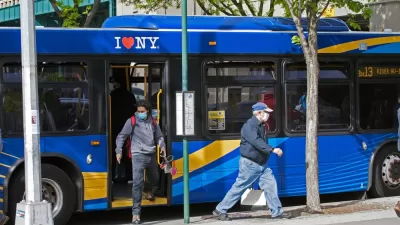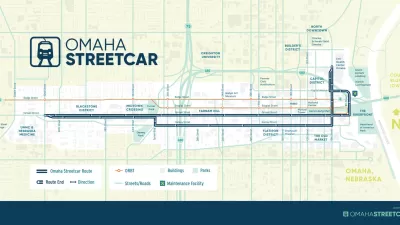Omaha sets out to prove that strong transit isn't just "a Portland thing or a New York thing."
Eric Jaffe examines Omaha as a case study of a low-density city in the heartland beginning to embrace transit—and making smart moves to take advantages of its opportunities to do so.
First Jaffe notes that Omaha is far from the kind of dense urban environment that transit requires to thrive. Thus, the "city's Metro bus system averages just 18 boardings per revenue-hour, and only two of its 34 lines run every 15 minutes—the minimum threshold for show-up-and-go service."
But in addition to incremental improvements like increased population downtown and a bar shuttle recently launched by a microtransit start-up, the city is also moving forward with a sweeping overhaul of its bus network.
"At the end of May, Metro will debut its FORWARD plan: a fully reconfigured bus network that emphasizes more frequency, better night and weekend service, direct lines through high-ridership corridors, and grid-style access to many parts of the city. The top five routes will now all get 15-minute peak service, and there's a new max wait time of an hour across the system—down from 90-to-120 minutes."
Jaffe provides a lot more detail about the plan and its impacts, including maps and infographics to illustrate those points. Also of note, regarding the future of transit in Omaha, is that the Metro Forward plan also sets the stage for a bus rapid transit line, funded by a $15 million TIGER grant awarded in September. The city expects to launch an eight-mile BRT line by 2018.
FULL STORY: Omaha Just Designed a Way Better Transit System for Zero Cost

Maui's Vacation Rental Debate Turns Ugly
Verbal attacks, misinformation campaigns and fistfights plague a high-stakes debate to convert thousands of vacation rentals into long-term housing.

Planetizen Federal Action Tracker
A weekly monitor of how Trump’s orders and actions are impacting planners and planning in America.

In Urban Planning, AI Prompting Could be the New Design Thinking
Creativity has long been key to great urban design. What if we see AI as our new creative partner?

King County Supportive Housing Program Offers Hope for Unhoused Residents
The county is taking a ‘Housing First’ approach that prioritizes getting people into housing, then offering wraparound supportive services.

Researchers Use AI to Get Clearer Picture of US Housing
Analysts are using artificial intelligence to supercharge their research by allowing them to comb through data faster. Though these AI tools can be error prone, they save time and housing researchers are optimistic about the future.

Making Shared Micromobility More Inclusive
Cities and shared mobility system operators can do more to include people with disabilities in planning and operations, per a new report.
Urban Design for Planners 1: Software Tools
This six-course series explores essential urban design concepts using open source software and equips planners with the tools they need to participate fully in the urban design process.
Planning for Universal Design
Learn the tools for implementing Universal Design in planning regulations.
planning NEXT
Appalachian Highlands Housing Partners
Mpact (founded as Rail~Volution)
City of Camden Redevelopment Agency
City of Astoria
City of Portland
City of Laramie





























